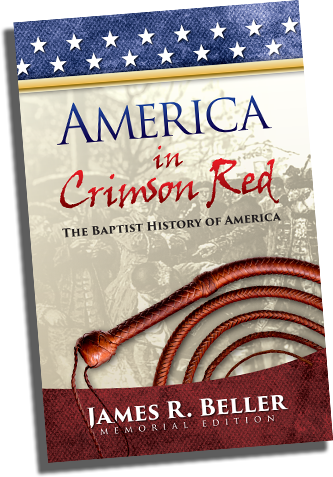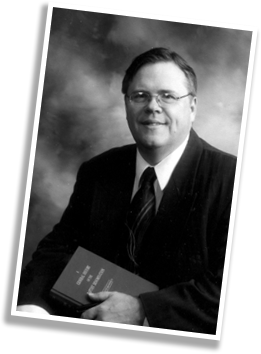B. H. Carroll on the Church
Editor’s disclaimer: While we disagree with Carroll on his usage of Bible texts other than the A.V., we do agree on his findings concerning the church.–jbeller
Baptists and Their doctrines
B. H. Carroll
Chapter 2 Ecclesia–The Church
Page 37:
Matt. 26:28, 19 has been for many centuries a battleground of theological controversies. Though millions of the disputants have passed away, the questions which arrayed them against each other still survive to align their successors in hostile array.
The most important of these divisive questions are:
- What is the church?
- Who established it, and when?
- What the foundation?
- What the “gates of hell”?
- What the “keys”?
- What the “binding and loosing”?
In replying to these questions it should constantly be borne in mind that all the intelligence, piety, sincerity, and scholarship of the world are not monopolized by anyone age, nor by any one denomination. Still less does infallibility of interpretation belong to any one party of conflicting views within a single denomination. And yet till less may any one man assume that wisdom on this subject will die with him. It becomes a single teacher, therefore, to be modest, and while he may
Page 38:
not from the nature of the case avoid dogmatism, let him at least shun offensive dogmatism and be duly considerate of the feelings of others.
Of one thing you may be assured, that these questions cannot be satisfactorily answered by any human ipse dixit. Nor is there the slightest hope of solution in appeals to human creeds and histories. These are as variant and conflicting as their composers and all are without shred of authority.
Let it be enough for us to seek a solution satisfactory to our own minds in the study for ourselves f the Bible alone.
You will understand, therefore, that the conclusions herein set forth, though reached by careful, prayerful and honest study of the one book alone, are worth no more than their intrinsic merit may warrant, and that having already given you a list of all the New Testament uses of the word, you are left entirely free to test every conclusion for yourselves, by the given usage, and then to accept, modify or reject it, as your own judgment and conscience may direct.
In this lecture there will be time for answer to the first question only:
WHAT IS THE CHURCH?
From the given list of passages, taken from the Englishman’s Greek Concordance, and which you
Page 39:
may verify by reference to the Bible, it appears that the word ecclesia, usually rendered “church” in our version, occurs 117 times in the Greek New Testament (omitting Acts 2:47 as not the best texts).
Our Lord and the New Testament writers neither coined this word not employed it in any unusual sense. Before their time it was in common use, of well-understood signification, and subject like any other word to varied employment, according to the established laws of language. That is, it might be used abstractly, or generically, or particularly, or prospectively, without losing its essential meaning.
To simplify and shorten the work before us, we need not to leave the New Testament to find examples of its classic or Septuagint use. Fair examples of both are listed in the list of New Testament passages given you.
What, then, etymologically, is the meaning of this word?
Its primary meaning is: An organized assembly, whose members have been properly called out from private homes or business to attend to public affairs. This definition necessarily implies prescribed conditions of membership.
This meaning, substantially, applies alike to the ecclesia of self-governing Greek state (Acts 19:39), the Old Testament ecclesia or convocation of National Israel (Acts 7:38) and to the New Testament ecclesia.
Page 40
When, in this lesson, our Lord says: “On this rock I will build MY ecclesia,” while the “my” distinguished his ecclesia from the Greek state ecclesia and the Old Testament ecclesia, the word itself naturally retains its ordinary meaning.
Indeed, even when by accommodation it is applied to an irregular gathering (Acts 19:32, 41) the essential idea of assembly remains.
Of the 117 instances of use in the New Testament certainly all but five (Acts 7:38; 19:32, 39, 42; Heb. 2:12) refer to Christ’s ecclesia. And since Hebrews 2:12, though a quotation from the Old Testament, is prophetic, finding fulfillment in New Testament times, we need not regard it as an exception. These 113 uses of the word, including Hebrews 2:12, refer either to the particular assembly of Jesus Christ on earth, or to his general assembly in glory.
Commonly, that is in nearly all the uses, it means: The particular assembly of Christ’s baptized disciples on earth, as “The church of God which is at Corinth.” To this class necessarily belong all abstract or generic uses of the word, for whenever the abstract or generic finds concrete expression, or takes operative shape, it is always a particular assembly. This follows from the laws of the language governing the use of words.
For example, if an English statesman, referring to the right of each individual citizen to be tried
Page 41:
by his peers, should say: “On this rock England will build her jury and all the power of the tyrants shall not prevail against it,” he uses the term jury in an abstract sense, i.e., in the sense of an institution. But when this institution finds concrete expression, or becomes operative, it is always a particular jury of twelve men, and never an aggregation of all juries into on big jury.
Or if a law writer should say: “In trials of facts, by oral testimony, the court shall be the judge of the facts,” and if he should add: “In giving evidence, the witness shall tell what he knows to the jury, and not to the court,” he evidently uses the terms “court,” “jury” and “witness” in a generic sense. But in the application the generic always becomes particular—i.e., a particular judge, a particular jury or a particular witness, and never an aggregate of all judges into one big judge, nor of all juries into one big jury, nor of all witnesses into one big witness. Hence we say that the laws of language require that all abstract and generic uses of the word ecclesia should be classified with the particular assembly and not with the general assembly.
As examples of the abstract use of ecclesia, that is in the sense of an institution, we cite Matt. 16:18; Eph. 3:10, 21.
Matt. 18:17 is an example of generic use. That is, it designates the kind (genus) of tribunal to which difficulties must be referred without restrict-
Page 42:
tion of application to any one particular church by name. I mean that while its application must always be to a particular church, yet it is not restricted to just one, as the church at Jerusalem, but is equally applicable to every other particular church.
As when Paul says: “ The husband is the head of the wife,” the terms “husband” and “wife” are not to be restricted in application to John Jones and his wife, but apply equally to every other specific husband and wife.
But while nearly all of the 113 instances of the use of ecclesia belong to the particular class, there are some instances, as Heb. 12:23 and Eph.5:25-27, where the reference seems to be to the general assembly of Christ. But in every such case the ecclesia is prospective, not actual. That is to say, there is not now but there will be a general assembly of Christ’s people. That general assembly will be composed of all time.
Here are three indisputable and very significant facts concerning Christ’s general assembly:
- Many of its members, properly called out, are now in heaven.
- Many others of them, also called out, are here on earth.
- Indefinite millions of them, probably the great majority, yet to be called, are neither on earth nor in heaven, because they are yet unborn, and therefore non-existent.
Page 43:
It follows that if one part of the membership is now in heaven, another part on earth, another part not yet born, there is as yet no assembly, except in prospect.
And if a part, probably the majority, is as yet non-existent, how can one say the general assembly exists now?
We may, however, properly speak of the general assembly now, because, though part of it is yet non-existent, and though there has not yet been a gathering together of the other two parts, the mind may conceive of that gathering as an accomplished fact.
In God’s purposes and plans, the general assembly exists now, and also in our conceptions or anticipations, but certainly not as a fact. The details of God’s purpose are now being worked out, and the process will continue until all the elect have been called, justified, glorified and assembled.
Commenting on our lesson, Dr. Broadus says: “In the New Testament the spiritual Israel, never actually assembled, is sometimes conceived of as an ideal congregation or assembly, and this is denoted by the word ecclesia.” Here Dr. B. does not contrast “spiritual Israel” with a particular church of Christ, but with national or carnal Israel.
The object of the gospel, committed to the particular assembly in time, is to call out or summon those who shall compose the general assembly in eternity.
Page 44:
When the calling out is ended, and all the called are glorified, then the present concept of a general assembly will be a fact. Then and only then, actually, will all the redeemed be an ecclesia. Moreover, this ecclesia in glory will be the real body, temple, flock, or bride of our Lord.
But the only existing representation or type of the ecclesia in glory (i.e., the general assembly) is the particular assembly on earth.
And because each and every particular assembly is the representation, or type, of the general assembly, to each and every one of them are applied all the broad figures which pertain to the general assembly. That is, such figures as “the house of God,” “the temple of the Lord,” “the body,” or “flock” or “bride of Christ.” The New Testament applies these figures just as freely and frequently to the particular assembly as to the general assembly. That is, to any other particular assembly, by itself alone, but never to all the particular assemblies collectively.
There is no unity, no organization, nor gathering together and, hence no ecclesia or assembly of particular congregations collectively. So also the term ecclesia cannot be rationally applied to all denominations collectively, nor to all living believers collectively. In no sense are any such unassembled aggregates an ecclesia. None of them constitutes the flock, bride, temple, body or house of god, either as a
Page 45:
type of time or a reality of eternity. These terms belong exclusively either to the particular assembly now or the general assembly hereafter.
A man once said to me, How dare you apply such broad terms as “The house of God,’’ “The body of Christ,” “The temple of the Lord,” to your little fragment of a denomination? My reply was, I do not apply them to any denomination, nor to any aggregate of the particular congregations of any or of all denominations, but the Scriptures do apply every one of them to a particular New Testament congregation of Christ’s disciples.
Hear the Word of God:
In the letter to the Ephesians, Paul says: “In whom all the building fitly framed together groweth unto an holy temple in the Lord:
22 In whom ye also are builded together for an habitation of God through the Spirit.” (Eph. 2:21, 22.)
Here are two distinct affirmations:
- First—Each several building or particular assembly growth into a holy temple of the Lord. That is, by itself it is a temple of the Lord.
- Second—What is true of each is true of the church at Ephesus, “In whom ye also are builded together for a habitation of God through the Spirit.”
Just before this he had written of the church as an institution, or abstractly, in which Jew and Gentile are made into one. But the abstract becomes concrete in each several building.
Page 46:
To the elders of this same particular church at Ephesus he said: “Take heed to yourselves, and to all the flock, in which the Holy Spirit hath made you bishops, to feed the church of the Lord which he purchased with his own blood.” (Acts 20:28)
This flock, this church of the Lord, purchased by his own blood, is a particular assembly. Again to the particular church at Corinth Paul wrote: “Ye are God’s building—ye are a temple of God and the Spirit dwelleth in you – now ye are the body of Christ, and severally members thereof.” (1 Cor. 3:7, 16; 12:27.)
When concerning the body of Christ he says: “And whether one member suffereth all the members suffer with it,” he is certainly not speaking of the ecclesia in glory, all of whose members will be past sufferings an ecclesia.
Again concerning the particular church at Ephesus, he writes to Timothy, whom he had left in that city; “These things write I unto thee, hoping to come unto thee shortly; but if I tarry long, that thou mayest know, how men ought to behave them selves in the house of God, which is the church of the living God, the pillar and ground of the truth.” He is certainly not writing of behavior in the general assembly in glory. The things he had written touching behavior were, when and how the men should pray, how the women should dress and work, and the qualifications of the bishops and deacons. Even that remarkable passage, so often and so confi-
Page 47:
dently quoted as referring exclusively to some supposed now-existing. “universal, invisible spiritual church,” namely: Eph. 1:22, 23, “And gave him to be head over all things to the church, which is his body, the fullness of him that filleth all in all”—even this very body, “filled unto all the fullness of God,” is presently applied, in his prayer, to the particular congregation. (Eph. 3:19.)
But is may be asked how could Paul pray that a particular congregation might be filled unto all the fullness of God? The reply is obvious. Each particular assembly is an habitation of god through the Spirit. The Spirit occupies each several building. Into each he enters not with partial power, but in all fullness of Omnipotent power.
But though the fullness is there, the church is so dim-eyed—so weak in faith—so feeble in graces—it does not realize and lay hold of and appropriate this fullness of God. Hence the prayer that the eyes of their understanding might be open to see the fullness, their faith increased to grasp and appropriate it, their graces enlarged to corresponding strength to stand and work in that fullness. So fulfilled they realize in experience the fact that the Holy Spirit in all the fullness of God had already entered this particular body of Christ, and was only waiting to be recognized. It is like the expression, “Being justified by faith, let us have peace with God,” etc. (Rom. 5:1.) That is, we are entitled to it, let us take it.
Page 48:
In a great revival of religion we see Paul’s prayer fulfilled in the particular body of Christ. Gradually the church warms up to a realization of the fullness of God dwelling in them through the Spirit. Their spiritual apprehension becomes eagle-eyed. The grasp of their faith becomes the grip of a giant. Presently they say, we “can do all things.” No barrier is now insurmountable. And as more and more they comprehend the height and depth and width and length of the love of God, they glow like a spiritual furnace. Thus it is proven that all these broad terms appertaining to the future general assembly are equally applied to the present particular assembly, and that, too, because it is the only existing representation of the prospective general assembly.
This leads to another conclusion: All teaching in the direction that there now exists a general assembly which is invisible, without ordinances, and which is entered by faith alone, will likely tend to discredit the particular assembly, which does now really exist and which is the pillar and ground of the truth.
More than once when I have acquired of a man, are you a member of the church? the reply has been, I am a member of the invisible, universal, spiritual church. To make faith the exclusive term of admission into the general assembly is more than questionable and naturally generates such replies.
Page 49:
The general assembly, by all accounts, includes all the saved. But infants, dying in infancy, are a part of the saved. Yet never having been subjects of gospel address they are saved without faith. But it may be said that such use of the term faith is only a way of saying “a new heart,” and dying infants are not without regeneration. To which we may rejoin that regeneration alone is not sufficient to qualify for membership in the general assembly. All the regenerates we know have spots and wrinkles, while the Bride, the general assembly, is without spot or wrinkle, or any such thing.
Nor does complete satisfaction of soul go far enough. There must also be glorification of the body. Enoch, Elijah and probably those who rose from the dead after Christ’s resurrection are the only ones as yet qualified for membership in the general assembly. And they must wait until all whom God has called and will yet call have arrived with like qualifications, before there can be a general assembly in fact.
As has been intimated, all organized assemblies have prescribed terms or conditions of member ship. In the Greek state ecclesia membership was limited to a well-defined body of citizens. Not all residents of the territory could participate in the business of the ecclesia. So with the Old Testament ecclesia or national convocation of carnal Israel. One must have the required lineal descent and be circumcised or become a proselyte and be circumcised. Corre-
Page 50:
spondingly the conditions of the membership in the church on earth are regeneration and baptism.
But for the church in glory the conditions of membership are justification, regeneration, and sanctification of the soul and glorification of the body.
We submit another conclusion:
Some terms or descriptives commonly applied to the church by writers and speakers are not only extra-scriptural, that is, purely human and post apostolic, but may be so used as to become either misleading or positively unscriptural. For example, to put visible, referring to the particular assembly alone, over against spiritual as referring to the general assembly alone, as if these terms were opposite or incompatible with each other.
The particular assembly or church that now is, is both visible and spiritual.
To confess Christ before men, to let our light shine before men, to be baptized, to show forth the Lord’s death in the Supper, are both visible and spiritual acts of obedience. And when the general assembly becomes a reality instead of a prospect, it, too, will be both visible and spiritual.
Speaking of the general assembly, John says: “I saw the holy city, the New Jerusalem, coming down out of heaven from God, made ready as a bride adorned for her husband.”
When the King came to the earth in his humiliation he was visible. And when he appears in glory every eye shall see him.
Page 51:
A city set upon an earthly hill cannot be hid. And the New Jerusalem on Mt. Zion, the city of the living God, will be the most conspicuous and luminous object the universe ever saw.
The confusion wrought by these human appellatives is manifest in the growth of what is commonly miscalled “the Apostles creed.” In its earliest historic forms it says: “I believe in the holy church.” Later forms say: “I believe in the holy catholic, i.e., universal church.” Still later: “in the holy catholic and apostolic church.” Still gathering increment from other creeds it becomes: “The holy Roman catholic and apostolic church.” Then comes “visible vs. invisible,” or “visible, temporal, universal vs. invisible, spiritual, universal,” and so ad infinitum. But the Bible in its simplicity knows nothing of these scholastic refinements of distinction. In that holy book the existing church is a particular congregation of Christ’s baptized disciples, and the prospective church is the general assembly.
But mark you: These are not co-existent.
One cannot be a member of both at the same time. When the general assembly comes the particular assembly will have passed away.
To impress more deeply the scripturalness of these reflections, let us consider the subject from another viewpoint:
A house is built for an inhabitant. Unless the tenant is hard pressed, he will not move in until
Page 52:
the building is completed. God is never hard pressed.
A long time may be consumed in getting out and gathering together and preparing the material of a house. It is not a house, however, except in purpose, plan, or prospect, until it is completed and ready for its occupant.
In this light let us take a look at some Bible houses:
(a)The that Moses built.
This was the Tabernacle of the Wilderness, or the tent for God. The 40th chapter of Exodus tells of the completion of this house. When it was finished and all things ready for the occupant it became a house, and then the cloud, that symbol a divine glory, moved in and filled the tabernacle.
(b)The house that Solomon built.
The 6th, 7th and 8th chapters of 1 Kings tell us about this house. When it was finished and furnished and dedicated, it also being now a house, then the cloud symbol of divine presence and glory, that had inhabited the tabernacle, left the tent as no longer useful and moved into and filled the new house.
(c)The house that Jesus built.
The gospel histories tell us about it. John the Baptist prepared much material for it. Receiving this material from John, and adding much of his own preparation, Jesus built a house. That is, he instituted his ecclesia on earth. At his death the
Page 53:
veil of Solomon’s restored house was rent in twain from top to bottom. Henceforward, it was tenantless, and, being useless, soon perished. But though the new house was built, it was empty until our Lord ascended into heaven, and fulfilled his promise to send the Holy Spirit as the indweller of this new habitation. Acts 2 tells us how this house was occupied. The useless temple of Solomon now passes away as the useless tabernacle of Moses passes away for its successor. The only house of God now existing is the particular ecclesia of our Lord. But it in turn must have a successor in the general assembly, or,
(d) The house Jesus will build.
The tabernacle, the temple and the church on earth are all forecasts of the coming church in glory. The work of gathering and preparing material for the general assembly has been in progress for six thousand years. But material, much of it yet in the quarry of forest and little of it fully prepared, does not constitute a house. God is not hard pressed. His patience is infinite. Millions and millions have already been called out to be members of this prospective assembly. God is calling yet and will continue to call throughout the gospel dispensation. His mind is fixed on having a general assembly indeed—a great congregation—“a great multitude that no man could number, of all nations, and kindreds, and people, and tongues, to stand before the throne, and before the
Page 54:
Lamb, clothed with white robes and with palms in their hands.”
The time of the constitution of this assembly is at the second coming of Christ and after the resurrection of the dead and the glorification of the bodies of Christ then living. The processes of constitution are clearly set forth in Matt. 25:31-34; 1 Cor.15:51-54; 1 Thess. 4:13-17; Eph.5:27; Rev. 21:2-9
It has now indeed become a church—a glorious church, or church in glory—to be presented to himself as a bride without spot, wrinkle, or any such thing. When he comes he will be glorified in his saints and admired in all them that believe.
That ecclesia, like the one on earth, will be both visible and spiritual. “I will show thee the bride, the Lamb’s wife,” says the angel to John.
Recurring to the figure of a house, Rev. 21 and 22 exhibit it as at last completed and occupied. At last completed and occupied. At last completed God himself inhabits it, for says the Scripture, “Behold the tabernacle of God is with me, and he shall be with them, and they shall be his people, and God himself shall be with them and be their God. And God shall wipe away all tears from their eyes; and there shall be no more death, neither sorrow, nor crying, neither shall there be any more pain; for the former things are passed away.” Mark that, brethren, “The former things are passed away.” Former and latter things are not co-existent. The tabernacle of the wilderness
Page 55:
passes away for the more glorious temple of Solomon. The temple then passes away for the still more glorious church on earth. In like manner the church on earth must pass for the infinitely glorious church in heaven. There is a Jerusalem on earth, but the heavenly Jerusalem is above. It is free, and the mother of all the saved. But, brother, the general assembly is not yet. The church on earth, the house that Jesus has already built, the house of the living God, which is the pillar and ground of the truth—this house has the right of way just now. It is the only existing assembly. Honor the house that now is.
Quite naturally, if tabernacle and temple had been co-existent, one then living would have preferred the temple and discredited the tent.
Equally so if the particular assembly and general assembly are now co-existent, side by side on earth, could you seriously blame a man for resting content with the membership in the greater and more honorable assembly?
But as the Scriptures represent these two assemblies, one existing now on earth, the other prospective in heaven, if a man on earth and in time, not qualified by either satisfaction of spirit or glorification of body for the heavenly assembly, shall despise membership in the particular assembly because claiming membership in the particular assembly, is not his claim both an absurd and a pretext? Does he not hide behind it to evade honoring
Page 56:
God’s existing institution, and the assuming of present responsibilities and the performing of present duties? Yet again, if one believes that there are co-existent on earth and in time, two churches, one only visible and formal, the other real, invisible and spiritual, is there not danger that such belief may tend to the conviction that the form, government, policy and ordinances of the interior church are matters of little moment? Has not this belief often times in history done this very thing? And is it not an historical fact that, since Protestant Pedobaptists invented this idea of a non-existing, invisible, universal, spiritual church, to offset the equally erroneous Romanist idea of a present visible, universal church, reverence and honor for God’s New Testament particular church have been ground to fine powder between them as between the upper and nether millstones? Today when one seeks to obtain due honor for the particular assembly, its ordinances, its duties, is he not in many cases, by objections arising from one or the other of these erroneous views?
And when some, endeavoring to hedge against the manifest errors of both these ideas, have invented middle theories to the effect that the church on earth is composed either of all professing Christians living at one time, considered collectively, or of all real Christians so living and so considered, or of all existing denominations considered as
Page 57:
branches of which the church is the tree, have they not multiplied both the absurdities and the difficulties y their assumed liberality of compromise?
Finally, replying to some of your questions:
1. When our Lord says, On this rock I will build my church and the gates of hell shall not prevail against it, does he refer to the church on earth or to the church in glory? My answer is, to the particular assembly on earth, considered as an institution. The church in glory will never be in the slightest danger of the gates of hell. Before it becomes an assembly, both death and hell, gates and all, are cast into the lake of fire. (Rev. 20:14 and 21:4.) It is the church on earth that is in danger, from the fear of which this glorious promise is a guaranty.
2. Does your idea of “a general assembly” depend exclusively upon that phrase of doubtful application in Hebrews 12:23, which many good scholars, including prominent Baptists, construe with “myriads of angels” instead of with “the church of the First Born”? Certainly not. Though I myself strongly hold with our English versions in referring both the panegyros (general assembly) and the ecclesia (church) of that passages as Eph. 5:25-27; Rev. 7:9 and 21:24.
3. If the figures, “body” and “bride,” apply to each particular church, does not that teach that
Page 58:
Christ has many bodies, many brides? My answer is, first, that your objection, or supposed difficulty, lies not against my view, but against the express teaching of many scriptures. What the Scriptures teach is true, and difficulties and objections may take care of themselves. But, second, the objection is specious and the difficulty only apparent, since each particular assembly is a representation or type of the general assembly, and therefore the broadcast figures of the antitype may be applied to all its types without being obnoxious to the criticism. There may well be many representations of the body or bride of Christ.
4. Do you dis-fellowship your Baptist brethren who teach the present existence of “an universal, invisible, spiritual church”?
Most certainly not so long as they duly honor the particular assembly and its ordinances, as multitudes of them do, in spite of the natural tendency of their theory to discredit it. Many of them, known to me personally, are devoted to the particular church and its ordinances, responsibilities and duties, I delight to honor, fellowship and love these men. We agree that all the redeemed will constitute the general assembly, and then it will be the real body, bride, temple, flock and house of God. We differ as o the co-existence of the two assemblies. They say both now. I say the particular now and the general hereafter.
It will take a wider divergence than this to make
Page 59:
me dis-fellowship a Baptist brother, though I honestly and strongly hold that even on this point his theory is erroneous and tends practically to great harm. Yes, I do most emphatically hold that this theory is responsible for incalculable dishonor put upon the church of God on earth. I repeat that the theory of the co-existence, side by side, on earth of two churches of Christ, one formal and visible, the other real, invisible and spiritual, with different terms of membership, is exceedingly mischievous and is so confusing that every believer of it becomes muddled in running the lines of separation. Do let it sink deep in your minds that the tabernacle of Moses had the exclusive right away of in its allotted time and the temple of Solomon had the exclusive right of way in its allotted time—so the church of Christ on earth, the particular assembly, now has the exclusive right of way, and is without a rival on earth or in heaven—and so the general assembly in glory, when its allotted time arrives, will have exclusive right of way.
Had I lived in the days of Moses I would have given undivided honor to the tabernacle—in the days of Solomon to the Temple alone—and when the general assembly comes, that shall be my delight. But living now I must honor the house that Jesus built. It is the house of the living God, the pillar and ground of truth. To it are committed the oracles and promises of God. To it is given the great commission. It is the instructor of angels
Page 60:
and in it throughout all the ages of time is the glory of God. If I move out of this house, I must retain houseless until Jesus comes. It is the only church you can join in time.
5. What is the distinction, if any, between the kingdom and the church?
My answer is that the kingdom and the church on earth are not co-terminous. Kingdom, besides expressing a different idea, is much broader in signification than a particular assembly or than all the particular assemblies. The particular church is that executive institution or business body, within the kingdom, charged with official duties and responsibilities for the spread of the kingdom.
In eternity and glory church and kingdom may be co-terminous. Like the church, the kingdom in both time and eternity has both visible and spiritual aspects.
6. As a sufficient reply to several other questions: Let it be noted that this discussion designedly avoids applying certain adjectives to the noun “church,” not merely because the New Testament never applies them to ecclesia, but because they are without distinguishing force when contrasting the particular assembly with the general assembly. For example: “Local,” “visible,” “spiritual.” Locality inheres in ecclesia. There can be no assembly now or hereafter without a place to meet. When existing in fact, both the particular assem-
Page 61:
bly in time, and the general assembly in eternity, are both visible and spiritual.
Why attempt to distinguish by terms which do not distinguish? Katholikos (Catholic or Universal) is not a New Testament word at all and hence is never applied by inspiration to ecclesia. Nor is it a Septuagint word at all.
In post-apostolic times it crept without authority into the titles of certain New Testament letters, as “The First Epistle General (Katholikos) of Peter.” And even there it could not mean “universal,” since Peter, himself, four times limit his address:
(a)First to Jews (not Gentiles).
(b)Then to “elect” Jews (not all Jews).
(c)Then to elect Jews of the Dispersion (not to Jewish Christians in Palestine).
(d)Then to elect Jews of the Dispersion in “Pontus, Galatia, Cappodocia, Asia and Bithynia,” i.e., the comparatively small district of Asia Minor (not in the rest of Asia, Europe, and Africa). Neither in the sense of every place, nor of every person in the universe, can the English word “universal” be applied to ecclesia.
7. Certain other questions must be deferred to a subsequent lecture, namely:
(a) Did our Lord purpose and provide for the perpetuity of the church on earth as an institution until his second advert?
(b) Can this perpetuity be traced historically?
Page 62:
Also, in subsequent lectures will be considered the other questions of our lesson, namely: Who established the church and when, What its foundation, What the gates of hell, Signification of the keys, and of the binding and loosing.









